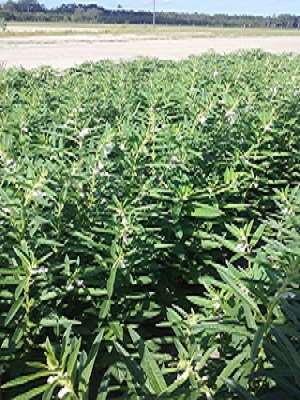By Romain Gloaguen

Sesame research has been carried out at the University of Florida (UF/IFAS) for more than 5 years now. Scientist there know more about the crop and its behavior in the Southeastern US than ever before. Research results from multiple aspects of sesame management, such as row spacing, cultivar selection, fertilization rates and timing, planting date and irrigation, is now being compiled and submitted for publication. These results will soon be available to interested growers in the region. The UF/IFAS team has also developed SesameFARM, a new irrigation scheduling model that has a similar platform to the model already available for peanuts called PeanutFARM (http://peanutfarm.org/).
Sesame is known to be a relatively low input crop, able to reach good yields with 60 lbs/ac of nitrogen fertilizer. It is also, and more importantly, drought tolerant. In fact, in some African countries it is the last crop that can be grown when every other crop fails under severe drought. This trait is particularly interesting since water consumption in Florida is likely to intensify in the coming years, accentuating the conflict between urban and farming uses. However, like all crops, sesame will perform better under irrigation.
The purpose of SesameFARM is to help growers with the irrigation management of their crop, taking advantage of its relatively low requirement for water. Sesame is a new crop for most growers in the Southeast, so questions arise about whether to irrigate or not because of the drought tolerant reputation of the crop. Common questions include, “How long can the crop resist a dry period?” and, “How can I determine if the crop is water stressed before the first wilting symptoms appear?” SesameFARM addresses these questions through utilizing phenological measurements of the crop over the past five years of research, and the application of a growing degree day (GDD) model for sesame. The development and validation of the model is a collaborative effort between UF/IFAS and the University of Georgia with Drs. Wes Porter and Scott Tubbs.
Source: ufl.edu